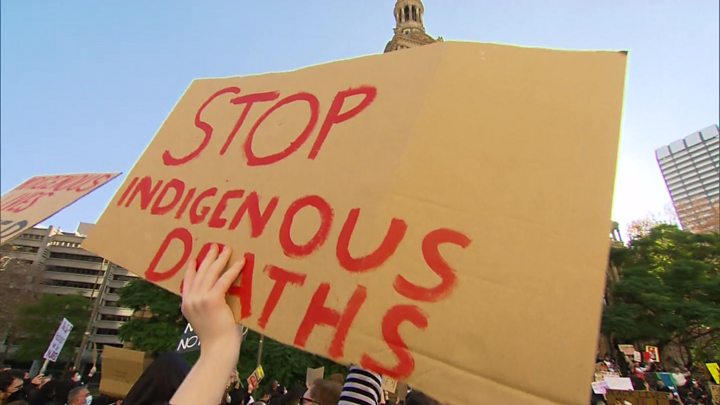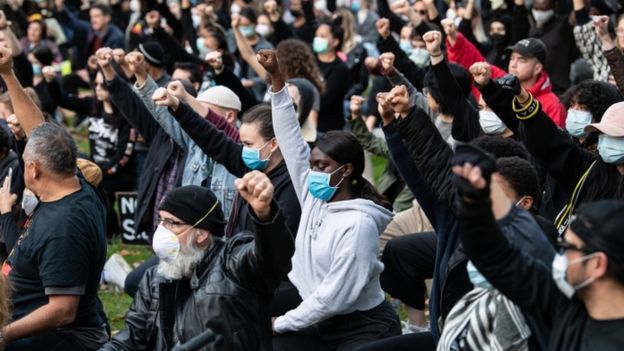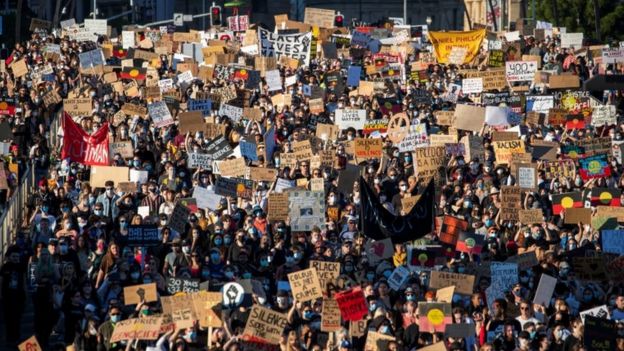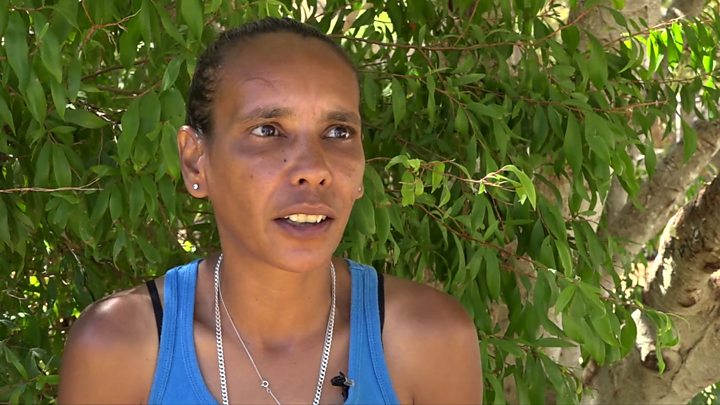
Media captionProtesters in Australia are also highlighting the mistreatment of Aboriginal people
Tens of thousands of people have protested across Australia in support of the Black Lives Matter movement.
Rallies were held despite warnings from officials over the coronavirus.
A ban in Sydney was lifted only at the last minute and some organisers have been fined for breaking health rules.
The marches were inspired by the death of African American George Floyd in police custody but also highlighted the mistreatment and marginalisation of Australia's Aboriginal people.
Rallies were organised in Brisbane, Melbourne, Hobart, Adelaide and elsewhere.
They were held in high spirits with no reports of major unrest.
There were a few tense scenes later in the evening at Sydney's Central Station, with police using pepper spray, but there were only three arrests in the city overall, among a total of 20,000 protesters, police said.
Australia admits failings on indigenous equality
Although the rallies were sparked by the death of George Floyd in Minneapolis, many in Australia were also protesting against the treatment of its indigenous population by police.
Banners reading "I can't breathe" remembered the words of Floyd before his death, while another said: "Same story, different soil."

EPA Thousands protest in Sydney. Organisers urged attendees to try to observe social distancing

REUTERS There were massive crowds too in Brisbane
The Sydney protest had been ruled unlawful on Friday by the New South Wales Supreme Court under coronavirus social distancing rules.
NSW Police Minister David Elliott had said: "Freedom of speech isn't as free as we would like it to be at the moment. Rules at the moment are clear."
But organisers took the case to the state court of appeal and it overturned the ban on Saturday afternoon, just 15 minutes before the scheduled start.
The protest was authorised for 5,000 people. Health ministry directions would normally prohibit public gatherings of more than 10 people.
 Image copyright
Image copyrightGETTY
Resounding success for indigenous Australia
Frances Mao, BBC News, Sydney
I've covered so many protests in my home city in the past decade. Outside of climate change rallies at the start of the year, I can't recall a larger turnout, particularly for a rally about race.
They turned up even when it was initially illegal and despite the health fears. They were angry, they were passionate, they knew there were risks but they donned masks and carried signs anyway.
This is a resounding success for indigenous Australia.
Back in January people were struggling to breathe due to smoke from the bushfires. Today they were chanting "I can't breathe" - the choked words of George Floyd, but also David Dungay- an Aboriginal man who was fatally pinned down by five police officers in 2015.
For many Australians, the US protests have ignited fierce introspection of their country's own record of black deaths in custody. Aboriginal people remain the most incarcerated in the world by percentage of population - they make up just 3% of the nation's people but almost 30% of those in jail.
This has been the rate for decades - in fact it's become worse - but only now does there appear to be a large demand in the mainstream for change.
Organisers across Australia encouraged those attending rallies to use hand sanitisers and observe social distancing.
Images showed that although the majority of demonstrators have been wearing face coverings, many of the protesters have been close together.
The chief health official in the state of Victoria said it was "not the time to be having large gatherings".
Victoria police said on Saturday they would be fining organisers A$1,652 ($1,150; £900) each for breaking health rules. It was unclear if Melbourne's attending protesters would be fined.

GETTY IMAGES
Protesters chanted: "Always was, always will be Aboriginal land" and "Too many coppers not enough justice".
Leon Saunders, 77, demonstrating in Sydney, said: "The raw deal Aborigines have been getting in this country for my lifetime and many lifetimes before that is just not right.
"We can look at America and say what terrible things are happening over there but, right here on our home soil, there are just as bad things happening and they need to be improved."
A 1991 inquiry reported on 99 deaths of Aboriginal people in police custody, but a Guardian study found that at least 432 had died in custody since then.
Another protester in Sydney, Sarah Keating, said: "I thought Australians were resting on their laurels - just because we're not as bad as America doesn't mean we're good enough... 432 Aboriginal deaths in custody is atrocious. That number should never have gotten that high. It should just be zero."

Media caption Donors pay debts of jailed Aboriginal women
No police officer has ever been held criminally responsible for an Aboriginal death in custody.
Many of the demonstrators in Brisbane were wrapped in indigenous flags.
Protesters chanted: "Always was, always will be Aboriginal land" and "Too many coppers not enough justice".
Leon Saunders, 77, demonstrating in Sydney, said: "The raw deal Aborigines have been getting in this country for my lifetime and many lifetimes before that is just not right.
"We can look at America and say what terrible things are happening over there but, right here on our home soil, there are just as bad things happening and they need to be improved."
A 1991 inquiry reported on 99 deaths of Aboriginal people in police custody, but a Guardian study found that at least 432 had died in custody since then.
Another protester in Sydney, Sarah Keating, said: "I thought Australians were resting on their laurels - just because we're not as bad as America doesn't mean we're good enough... 432 Aboriginal deaths in custody is atrocious. That number should never have gotten that high. It should just be zero."

Media caption Donors pay debts of jailed Aboriginal women
No police officer has ever been held criminally responsible for an Aboriginal death in custody.
Many of the demonstrators in Brisbane were wrapped in indigenous flags.
No comments:
Post a Comment